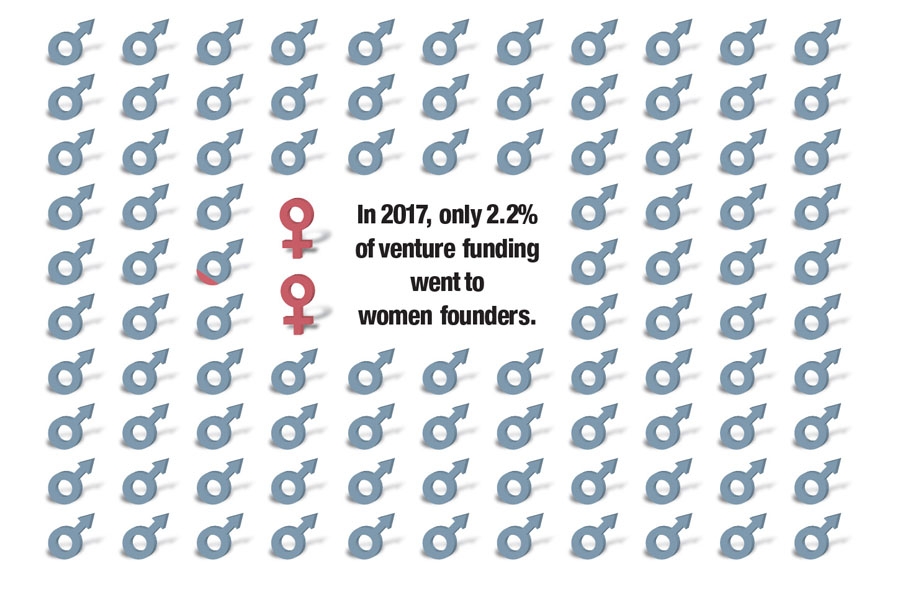How inherent bias in venture capital funding is bad for business.
Technology has been shaping our lives for decades and will continue to do so for decades to come. At its core, it’s an industry run by humans and their flaws, and together they have a huge impact on humanity. Behind every new tech company or product are the humans who built it – each with their own assumptions, beliefs, values, biases, hopes and dreams.
All of this baggage has created several problems within the industry. Without change, it will create a dystopian society of similarly-minded folks, while the rest of the world with fresh ideas and different points of view remains underfunded and underrepresented. Consider how these challenges could affect the tech industry – and our society – long term.
Funding for only the few
All technologies began as an idea. Great ideas are everywhere and can be thought of by anyone – but for an idea to go anywhere, others must believe in and invest in it. Those who are able and willing to fund an idea also have baggage shaping what they view as worthy.
In 2017, only 2.2% of venture funding went to women founders and only a small fraction of that went to women of color. The root of this disparity is a result of several factors: only 8% of venture capitalists are women, women tend to ask for less and they are judged only by what they have achieved, not their potential. The fact remains that it is a homogenous group of individuals that achieve the necessary funding to execute on an idea.

Building teams of people who think alike
Once those fortunate enough to receive funding for their idea are ready to execute, they need to hire other humans – and will need to hire again when the original problems get too complicated or large to solve. The most common mistake in hiring, due to unconscious bias, is to hire people who are similar to yourself. Even the most well-meaning hiring managers struggle with this unless there are significant checks throughout the hiring process to identify and correct this behavior.
In venture-funded startups, hiring needs to happen quickly, which doesn’t leave much time for a well-thought-out hiring process – resulting in a system in which the humans within it have similar baggage. This baggage can reward groupthink, allowing for blind spots to occur as they build technologies and the business systems surrounding them. This is how it’s possible for companies like Uber to allow workplace harassment to carry on for years before being uncovered.
Moving too fast also creates environments where companies design technology that is modeled after a very narrow profile of a human, such as in 2015 when Google Photos automatically tagged photos of African Americans with racist terms.
Difficulty defining and maintaining culture
Even in situations where the founder or CEO of a tech company is enlightened about challenges in the industry, they’re constantly swimming upstream. Let’s pretend for a moment that the founder of a tech company is aware of their baggage and actively works to correct it. They do this by attempting to surround themselves with people willing to speak up and out, avoiding rewarding heroics or like-mindedness and vehemently defending the positive and inclusive culture they set out to build within the system.
Though these are good first steps in the right direction, the problem isn’t solved. This work will be ongoing, and it will need to happen over and over again.
How do we fix these problems? First, we need to recognize that this is a problem for all of us, not just for women, people of color and LGBTQ people. Corporate stockholders and boards should care because diversity leads to better business outcomes. Dominant populations should care because a world in which only one category of people can thrive in technology will create dystopian outcomes.
Diversity and inclusion are the right things to do for the healthy existence of humanity. Second, the systemic issue is a lack of financial access. Let’s be clear – money is power and when women, people of color and LGBTQ individuals are paid less, and have less access to capital or scholarships, they lack power. Without access to money, these individuals cannot care for themselves or their families, get an education, support causes that matter to them, or launch their ideas that will shape our collective futures. We must enact both of these solutions to build a world where technology reflects the people that make up our society.
Megan Bigelow is the founder and president of PDX Women in Tech, a nonprofit that works to empower women and underrepresented groups to join tech and provide support they need to stay in the industry.





